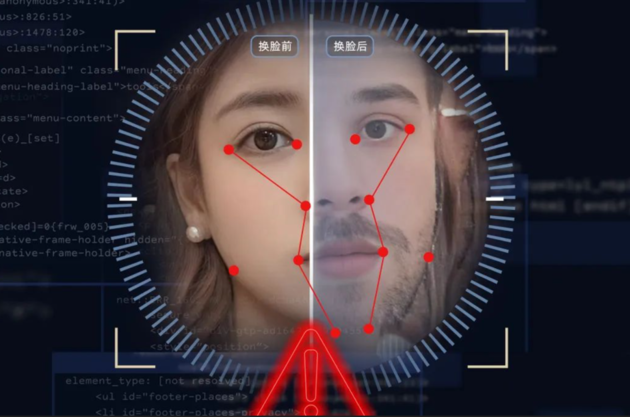In recent times, the rapid advancement of AI technology has brought about both convenience and new challenges.
A recent investigation by National Business Daily (NBD) uncovered a disturbing trend: the sale of AI face-swapping technology that can bypass platform algorithms and deceive users in real-time video calls and live broadcasts.
NBD found that for just $180, individuals can purchase AI faces of celebrities or even those of political figures and entrepreneurs.
This technology allows users to replace their own faces with these AI-generated ones in real-time during video calls and live streams and it's so advanced that even actions such as slapping the face, pressing the nose, showing teeth, and significant facial obstructions do not reveal the deception.
Real-Time Face Swapping for as Low as $180
"We can do it for anyone, whether they are Chinese or foreign celebrities, famous people, entrepreneurs, or ordinary individuals. It's up to you how you use it. We won't ask and we won't interfere," Xu Sheng (an alias), a staff member of an AI face-swapping company, told NBD during an undercover investigation. "It costs 1,980 yuan to customize a face. You need to pay a 500-yuan deposit first, and it will be ready in about five hours. Then you can use this face for video calls on platforms like WeChat and QQ, or for live streaming on Douyin and Kuaishou. The customized 'face' can be used permanently. If you order more, I can give you a discount. It's 1,600 yuan each for three or more, and you can switch 'faces' at any time."
To demonstrate the sophistication of the "AI face-swapping" technology, Xu Sheng proactively made a video call to the reporter via platforms like WeChat. During the call, he forcefully slapped his face, pressed his nose, showed his teeth, and even covered his face significantly, but the face-swapping effect did not fail. "You see, it won't 'fall off' no matter what. The voice can also be cloned. Once everything is set up, you just need to imitate the hairstyle and clothing of the person."
Xu Sheng mentioned that many people have come for "face-swapping" since the beginning of the year, and the company has been overwhelmed with orders. "I alone have taken nearly 1,000 orders. We have seven or eight devices here, and we work until five in the morning every day. If you want a celebrity's face, you can send me the name first. If it's already in our company's database (customized by previous customers), we can sell it at a discount, which is convenient for everyone and are readily available for 1,280 yuan (about $180) each."
When talking about the company's "customized faces," Xu Sheng said that they mainly focus on ordinary people's faces at present. "For celebrities, it's easier to be reported if they are used for live streaming on platforms."
These faces can be used for live streaming and video calls without detection.

The Black Market for AI Faces
The AI face-swapping technology works by "hijacking" the mobile phone's camera, thereby bypassing the platform's algorithmic monitoring.
Users only need to mimic the target person's hairstyle and clothing, and the AI will generate highly realistic voice and facial expressions, completing the entire forgery process. This technology has evolved to a point where it is nearly impossible to distinguish between real and fake content.
The investigation found that many IP owners on platforms like Douyin, Kuaishou, and Xiaohongshu are secretly promoting this technology.
This technology allows users to replace their own faces with these AI-generated ones in real-time during video calls and live streams on platforms like WeChat and Douyin. It's so advanced that even actions such as slapping the face, pressing the nose, showing teeth, and significant facial obstructions do not reveal the deception.
Platform Responses and Legal Implications
In response to this alarming trend, platforms like Douyin, Kuaishou, and WeChat have emphasized that they strictly prohibit the sale of AI face-swapping services and any similar products. These platforms have implemented measures to detect and remove content that involves unauthorized use of AI face-swapping technology.
Lawyer Jia Yuqian from Beijing Long'an Law Firm's Shanghai branch told the NBD that platforms are obliged to take down videos with fraud risks based on self-inspection and user complaints.
Yao Huanqing, Deputy Director, Civil and Commercial Law Science Research Center, Renmin University of China, suggested that platforms offering face-swapping services may bear responsibility as these services are more likely to be used for improper activities. Legislation is needed to clarify that face-swapping services should require government approval.
Douyin and Xiaohongshu representatives stated that their platforms prohibit promoting face-swapping technology that may infringe others' rights. They have implemented control measures for such content. WeChat also requires proof of identity for content featuring real people, whether or not AI technology is used.
Additionally, if users find any violations related to AI face-swapping, they can report them through official channels.
The Douyin e-commerce representative emphasized that the platform strictly prohibits the sale of AI face-swapping products and similar items. Violations will be dealt with severely, including shutting down offending shops if necessary.
Challenges in Detection and Regulation
Despite the efforts of platforms and legal authorities, detecting real-time AI face-swapping remains a significant challenge.
The technology's sophistication allows it to evade detection by platform algorithms, making it difficult to identify and block in real-time. Experts suggest that platforms need to upgrade their review and monitoring technologies to keep pace with the rapidly evolving AI capabilities.
The rise of AI face-swapping technology highlights the urgent need for stricter regulations and advanced detection mechanisms.
As AI continues to advance, it is crucial for platforms, legal authorities, and users to remain vigilant and take proactive measures to prevent misuse.
The balance between technological innovation and ethical use must be carefully maintained to protect individuals' rights and ensure a safe digital environment.


 川公网安备 51019002001991号
川公网安备 51019002001991号





